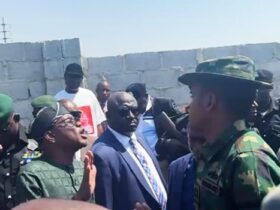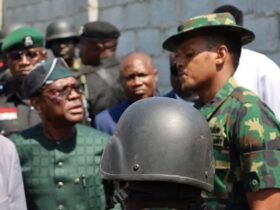A Nation in Turmoil
President Bola Tinubu has pointed fingers at Rivers State Governor Siminalayi Fubara for the escalating political crisis and recent pipeline explosion in the state. During a nationwide broadcast on Tuesday, March 18, 2025, Tinubu expressed deep concern over the deteriorating situation in Rivers State, accusing the governor of failing to address critical issues, including pipeline vandalism and the non-functionality of the state’s legislative arm. This comes just hours after Tinubu declared a state of emergency in Rivers State, a move that has sparked widespread debate and criticism.

Tinubu’s Accusations: A Governor Under Fire
In his address, President Tinubu did not mince words as he laid the blame for the ongoing crisis squarely on Governor Fubara’s shoulders. He accused the governor of demolishing the Rivers State House of Assembly complex and failing to rebuild it for the past 15 months, effectively crippling the legislative arm of government.
“The governor has not only dismantled the legislative arm of government but has also failed to address critical security issues, including pipeline vandalism,” Tinubu stated. He further referenced recent security reports, which highlighted incidents of pipeline vandalism by militants, accusing Fubara of inaction in the face of these threats.
“The latest security reports made available to me show that between yesterday and today, there have been disturbing incidents of pipeline vandalism by some militants, without the governor taking any action to curtail them,” the President said. He emphasized that such negligence posed a significant risk to the safety of Rivers State residents and the nation’s oil infrastructure.
The Declaration of a State of Emergency
Citing the breakdown of governance and the inability of political actors to resolve the crisis, Tinubu announced the declaration of a state of emergency in Rivers State. He explained that the decision was necessary to restore order, peace, and security in the oil-rich state.
“With all these and many more, no good and responsible President will stand by and allow the grave situation to continue without taking remedial steps prescribed by the Constitution to address the situation in the state,” Tinubu said. He stressed that extraordinary measures were required to address the crisis and ensure the safety of Rivers State residents.
As part of the emergency measures, Tinubu appointed retired Vice-Admiral Ibok-Ete Ibas to take over the administrative functions of the state. This move has been met with mixed reactions, with some praising it as a necessary intervention and others condemning it as an overreach of executive power.
The Political Crisis: A State in Chaos
The political crisis in Rivers State has been brewing for months, fueled by a power struggle between Governor Fubara and his predecessor, Nyesom Wike. The conflict has led to protests, violence, and a breakdown of governance, with the state legislature rendered non-functional due to the demolition of its complex.
Despite interventions from President Tinubu and other stakeholders, the parties involved have been unable to reach a truce. Tinubu expressed frustration over the lack of progress, stating that the continued instability in Rivers State was unacceptable and required immediate action.
Pipeline Vandalism: A National Security Threat
The recent pipeline explosion in Rivers State has further exacerbated the crisis, drawing attention to the growing threat of pipeline vandalism in the region. Tinubu highlighted the economic and security implications of these incidents, noting that they not only endanger lives but also disrupt oil production, which is critical to Nigeria’s economy.
“I have, of course, given a stern order to the security agencies to ensure the safety of the good people of Rivers State and the oil pipelines,” Tinubu said. He called for increased vigilance and collaboration between federal and state authorities to address the issue.
Opposition Reactions: A Divided Response
The declaration of a state of emergency and Tinubu’s accusations against Fubara have sparked a wave of reactions from political leaders and civil society groups. The Peoples Democratic Party (PDP) has rejected the move, describing it as unconstitutional and an attack on democracy. The party accused Tinubu of attempting to undermine the will of the people and impose an undemocratic rule in Rivers State.
On the other hand, supporters of the All Progressives Congress (APC) have defended the President’s decision, arguing that it was necessary to restore order and address the escalating crisis. They pointed to the breakdown of governance and the threat to national security as justification for the declaration.
The Bigger Picture: Implications for Nigeria
The crisis in Rivers State highlights the challenges of managing political conflicts in a diverse and complex nation like Nigeria. The federal government’s intervention raises critical questions about the balance of power between the federal and state governments, the role of the National Assembly in such decisions, and the future of democracy in the country.
For Rivers State, the immediate focus is on restoring stability and addressing the root causes of the crisis. The appointment of Vice-Admiral Ibas as administrator signals a shift toward a more centralized approach to governance, but it remains to be seen whether this will lead to lasting peace or further exacerbate tensions.
A Call for Unity and Resolution
As Nigeria grapples with the fallout from the crisis in Rivers State, the need for dialogue, transparency, and adherence to constitutional principles has never been more urgent. President Tinubu’s decision to declare a state of emergency underscores the gravity of the situation, but it also highlights the importance of finding sustainable solutions to the underlying issues.
The coming days will be critical as the federal government, state authorities, and other stakeholders work to restore peace and stability in Rivers State. For now, the nation watches and waits, hoping for a resolution that prioritizes the well-being of its people and the preservation of its democratic values.
















Got a Questions?
Find us on Socials or Contact us and we’ll get back to you as soon as possible.